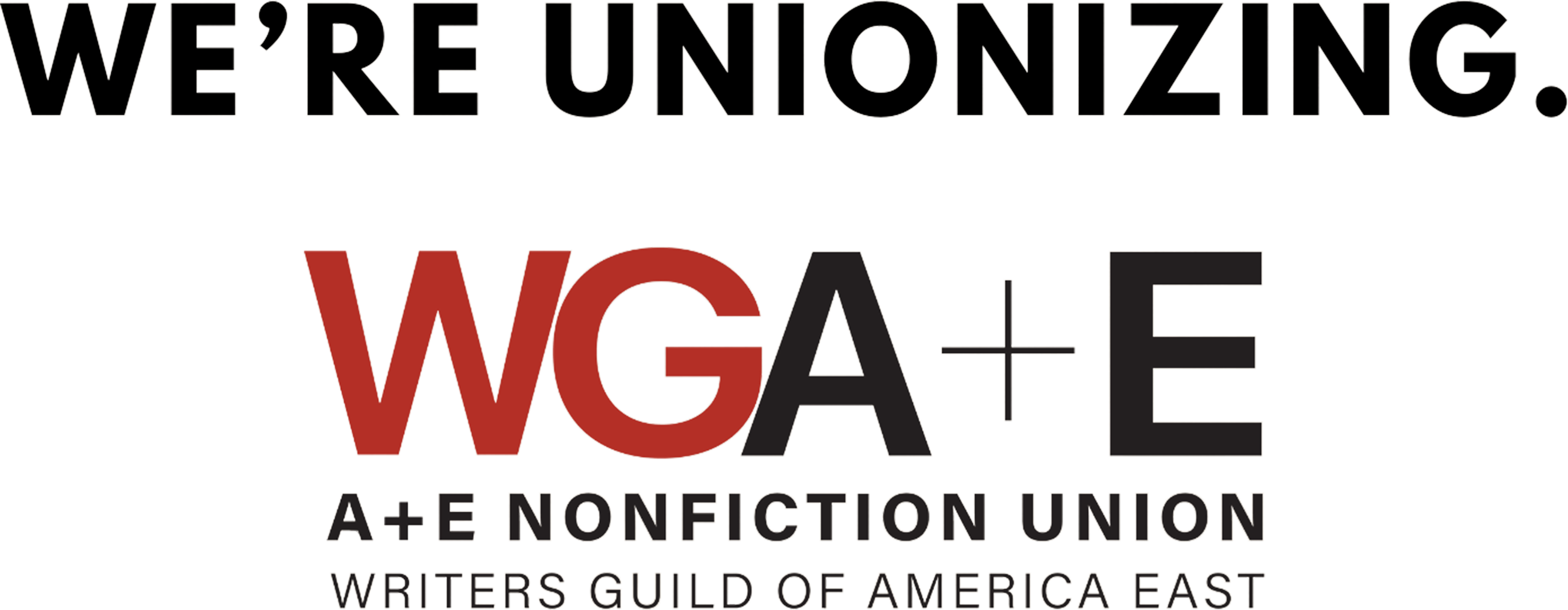
Why We’re Organizing
We, the dedicated workers of A+E Factual Studios behind hundreds of hours of programming a year for A+E, Lifetime, and the History Channel, are thrilled to announce that we have formed a union with the Writers Guild of America East.
We are dedicated to our profession, to our projects, and to the collaborative nature of television production. But the realities of the job can take a heavy toll. Tight turnarounds and unrealistic expectations from network executives mean that we routinely work long, unpredictable hours. We are frequently assigned the work of two people due to network cost-cutting, only for network executives to receive bonuses for coming in under budget.
We are passionate about our work, and we’re tremendously proud of what we create. But we also know that this system is unsustainable, and that the nonfiction television industry needs to change. We are resolved to create a collaborative, equitable, and respectful work environment, and we believe that unionizing will allow A+E to be a leader in the creation of a more equitable nonfiction television industry.
It’s with these truths in mind that we have decided to form a union for the benefit of us all — producers/writers, researchers, archivists, showrunners, studio and network executives — both at A+E and across the industry. We believe that the power of collective bargaining will demonstrate what it means to succeed together by allowing us to work with A+E Factual Studios to establish:
- Fair pay and benefits – We seek fair and competitive pay minimums and annual increases, signing and retention bonuses, and paid time off policies that support the success of all employees, rather than pitting us against each other and contributing to systemic pay disparities.
- Better working conditions and job protections – We hope to invest in the well-being and retention of current workers through better scheduling, adequate staffing and long-term contracts, clear assignments, and reasonable workloads and deadlines. We also seek terms that support sustainable careers in the industry at large through portable health insurance and union security.
- Professional advancement – We want to establish clear, achievable paths to promotion that help workers to develop successful long-term careers, and create specific structures to support the development of workers from underrepresented backgrounds in senior roles.
- Improved transparency, accountability and inclusivity – We want to establish stronger anti-harassment and discrimination policies to protect marginalized workers, improve communication between workers and management, and increase avenues for collective decision making.
We are proud to work for a company that commands such a huge influence in the nonfiction space, both through the content it produces and the name recognition it holds. What A+E does sets the tone – for every other unscripted studio, for the industry as a whole.
We invite A+E Factual Studios to continue its legacy as a leader in the nonfiction industry by recognizing our union and working together with us to achieve a fair, equitable union contract that sets the standard for what it means to work in nonfiction.
In Solidarity,
A+E Nonfiction Union
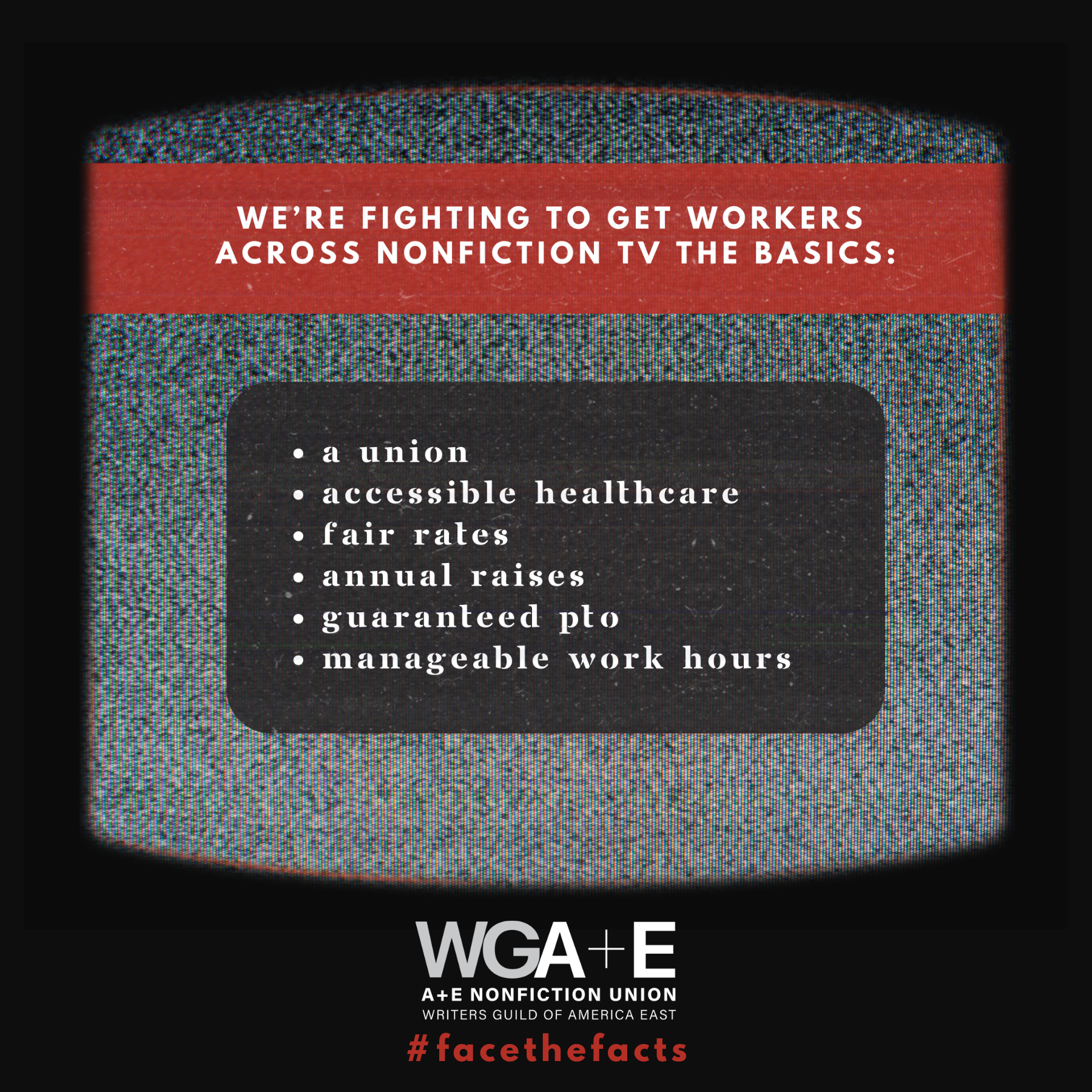
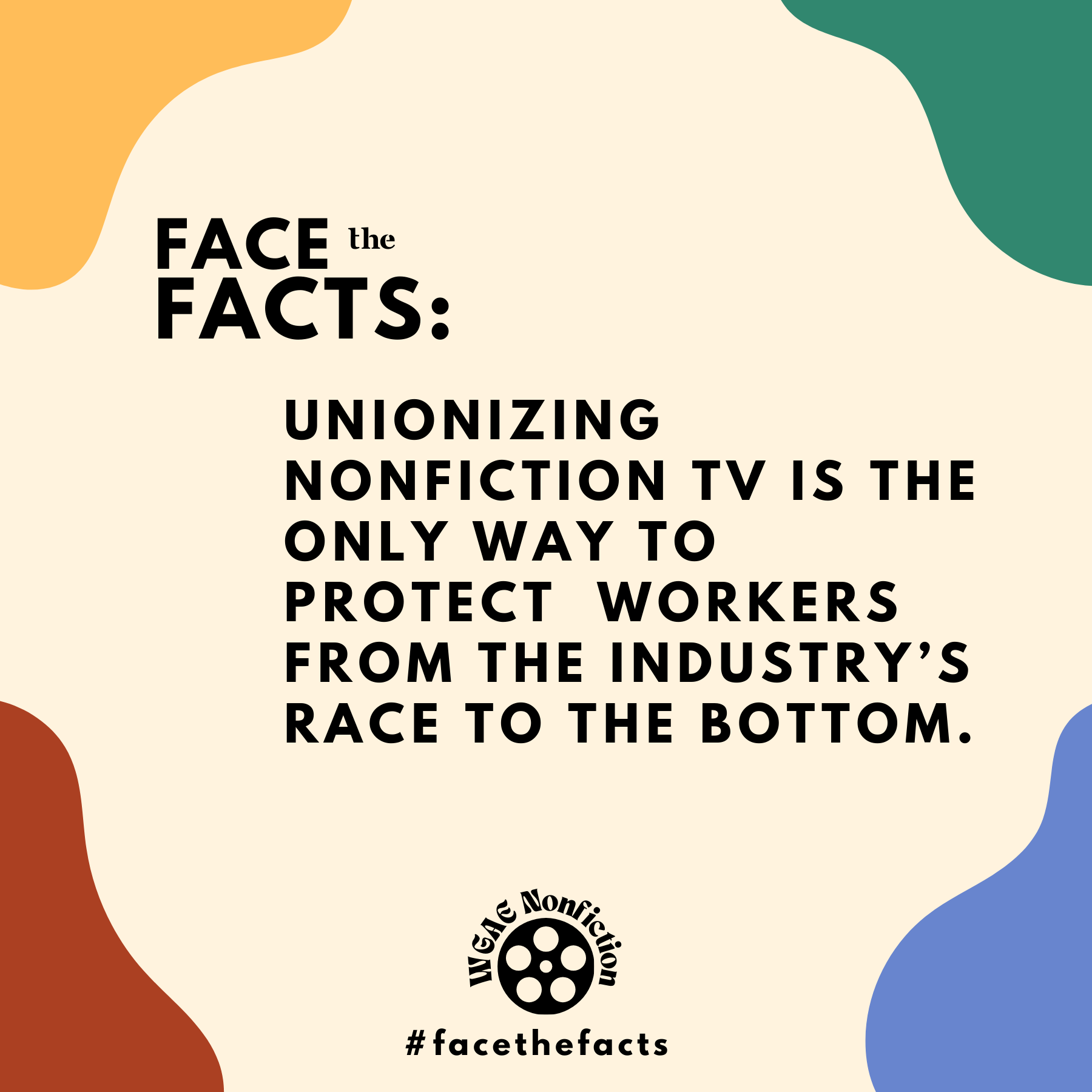
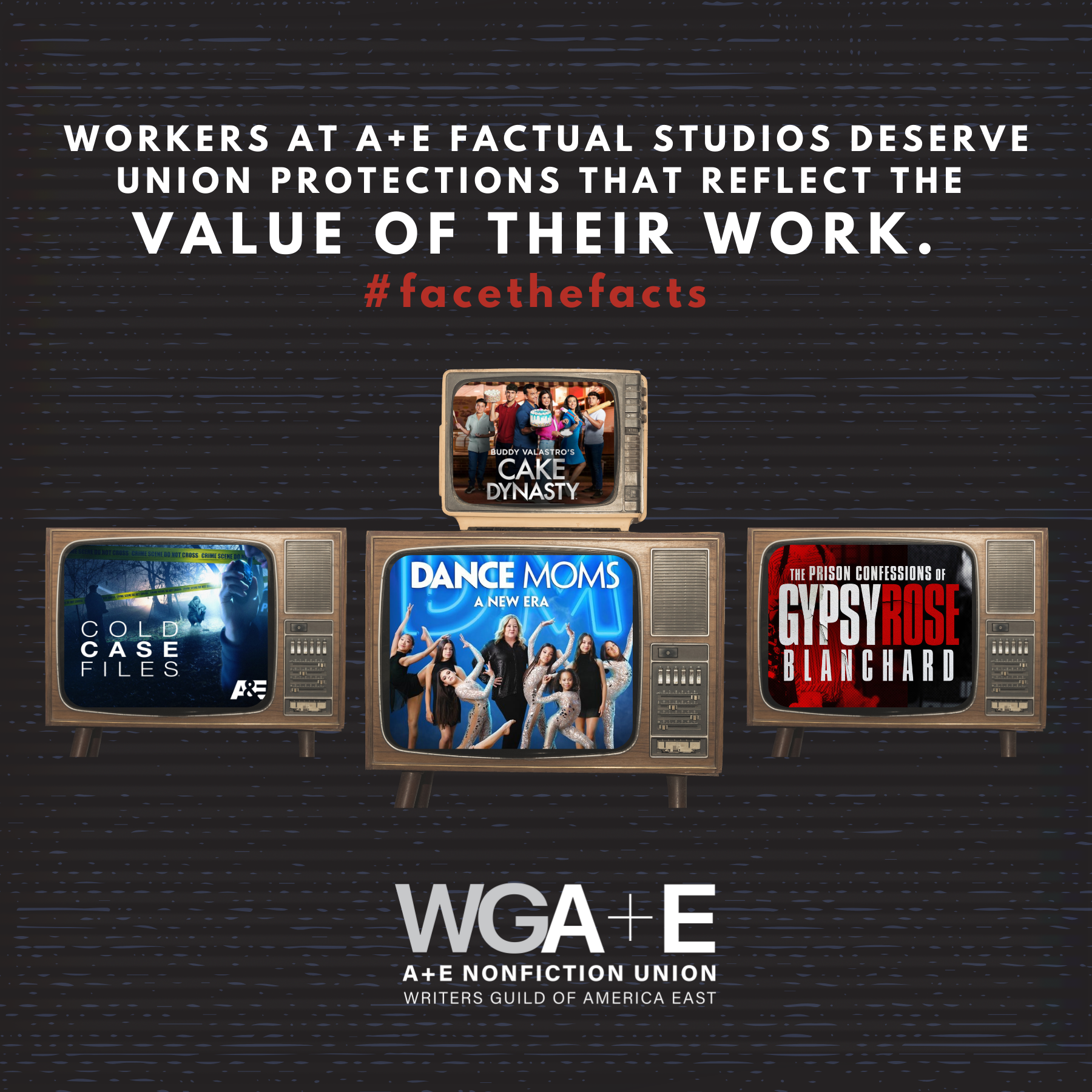
FAQ
A union is organized when a group of employees (e.g.: the story producers, researchers, APs, etc. at A+E Factual Studios) gather together to advocate for their interests and negotiate a contract with a company’s management in order to set minimum standards. Union contracts are very common across our industry and can address everything from salaries and benefits to diversity and inclusion. Throughout the entertainment industry, there are hundreds of examples of union contracts improving workplaces with transparency and equity — achieved by the employees who came together with other union members across the country to lift standards for all.
The Writers Guild of America East is a labor union of over 7,500 creative professionals working in digital media, broadcast news, and television and motion pictures. For decades, the Writers Guild has been essential in fighting for better standards in working conditions, compensation, and the rights of its members in their industry. WGAE’s mission is to build a community of creative professionals with the willingness to support one another and the power to secure fair standards across the media industry. For more information on the WGAE, please visit www.wgaeast.org.
The A+E Nonfiction Union will be part of WGAE — the Writers Guild is there to support us in our decisions and negotiations about what’s best for our workplace, not to dictate how we work. It’s important to note that for nonfiction professionals, that means our work opportunities are not restricted to only taking union opportunities.
WGAE has experience organizing nonfiction film and television. Some recent victories include winning a landmark first contract at Jigsaw for freelance employees and voluntary union recognition at BSTV Entertainment, Story Syndicate, and McGee Media for both staff and freelancers.
Furthermore, Writers Guild members already have union contracts at Vox Entertainment, Vice, Sharp Entertainment, LionTV, and NBC News Studios. All contracts are public and can be accessed here. Each contract was tailored to address issues that the producers at these respective companies wished to confront. So, it’s important to remember that certain points —like rates and standards, for example — are merely floors, not ceilings. Transparent minimum rates and expectations give folks a tool to ask for more in individual deal memos and are determined by what we make at A+E, not by what folks at other companies are making.
In the last few years, thousands of media employees have come together to unionize their workplaces and negotiate union contracts. Fundamentally, the demand of any group of workers forming a union is the same: to win a formal seat at the table in order to negotiate over the future of their work and raise standards across their industry. Each group decides what to advocate for at the bargaining table through a fair and democratic process.
Though priorities vary from workplace to workplace, the issues tend to revolve around the same categories. For nonfiction, these include core economic concerns – such as pay equity and transparency, preserving or improving benefits (leave time, 401k, portable health insurance) – as well as regular and fair cost of living increases, safe working conditions (monitoring overtime hours, turnaround time, rest periods), job security, intellectual property, proper crediting, and AI protections. Creative professionals also negotiate to address workplace culture issues, including: diversity and equity, corporate transparency and communication, and editorial policies and independence.
Negotiating a union contract is a core element of any unionized workplace. However, it doesn’t stop there: organized workplaces create structures for democratic representation and collective decision-making processes. That means that unionized companies have mechanisms in place to share information with all employees and to take collective action if and when necessary. This includes, for example, regular meetings with management and workplace diversity committees.
Leadership, internal structures, and strategies at media companies change rapidly. Organizing is a way to ensure a seat at the table and guarantee terms of employment, including policies on severance, layoffs, discipline, and termination. Basically, unionizing is not only a way to change things at a workplace you don’t like, but to preserve and protect the things that we do like, and to ensure that everyone has fair access to those things.
While companies expand and contract, we deserve to participate in decision-making about the future of the companies that we helped build and make profitable. But organizing a union isn’t just about the future of one company — it’s about the sustainability of our entire industry. Industries with strong union density, such as fiction film and television, have fewer pay gaps and higher compensation overall. WGAE members across the industry are working together to support each other and build a long-term movement to address a spectrum of systemic issues — from diversifying the entertainment industry to protecting critical journalism.
A workplace is “officially” unionized upon winning union recognition. Union recognition means that the company has a legal obligation to bargain a contract. Many production companies have respected their employees’ right to organize and voluntarily recognized their employees’ unions after a neutral third party verifies that a majority of employees have signed union cards or petitions (this was the case at Jigsaw, Vice, BSTV, Story Syndicate, McGee Media, and many other media companies in the past several years). We certainly hope A+E will respect our rights, avoid unnecessary delays, and voluntarily recognize our union.
Some media companies insist on a National Labor Relations Board (NLRB) election to certify union representation. Should management refuse to voluntarily recognize our union, we are prepared to file an election petition with the NLRB to secure an irrefutable union victory. You can read more about the NLRB election process here.
After winning recognition, we will nominate a bargaining committee that will work with WGAE’s Lead Negotiator to bargain a first contract with the company. First contract priorities are gathered through a survey process, meaning everyone covered by the contract has a voice in what goes in it. A union contract only goes into effect after bargaining to reach a tentative agreement. This agreement is then reviewed by the people it would cover and voted into place.
Collective bargaining is just that — bargaining. There are no guarantees of what we will win in a first contract, but there is a guarantee that the company must bargain in good faith with the committee you elect. The entire bargaining unit (every A+E Factual employee/freelancer eligible for union membership) would then vote on whether to ratify the contract before anyone is responsible for union dues.
WGAE members across the industry (including Jigsaw, Sharp, Lion, Vice, Vox Entertainment, and more) have bargained excellent contracts that guarantee good salary minimums with annual raises, good benefits, compensation/overtime for long hours, and help to ensure fairer workplaces.
Freelance employees of A+E Factual Studios who are currently working at the company, or have worked at the company within the last 12 months, that do not have managerial authority are eligible to sign a union card and may vote in a secret ballot election. This group is known as the bargaining unit – a group of non-supervisory workers who share a community of interest. In a freelance environment, it is common for someone who has worked at a company in the past year or so to be eligible to sign a union card and vote in an election. This is a more accurate picture of stakeholders and allows for those who may be hired back to have a say in the process, and not just those who may be working at the time. This is all subject to negotiation and while we are not sure yet who will be able to vote, you are encouraged to sign a union card as a first step
Additionally, in a creative workplace, it’s not always clear who is/isn’t a supervisor. The first step in determining someone’s eligibility is whether they want to be part of the union. If you’d like to learn more about your potential eligibility, please reach out to us at aenonfictionunion@gmail.com.
The final bargaining unit is subject to negotiation with A+E, a process ultimately overseen by the National Labor Relations Board (NLRB). This means that what is initially proposed may change depending on what we learn about the scope of each person’s work duties. The definition of the bargaining unit can also be contested by the employer, in which case we have legal, organizing and political options.
As outlined under Section 7 of the National Labor Relations Act (NLRA), it is our legal right to organize a union. The WGAE takes our rights very seriously and stands with employees to see that they are protected when they organize. You can read about your legal right to form a union on the National Labor Relations Board website.
Beyond legal protection from any kind of company retaliation, the union is a way to ensure we have job protection through the solidarity, strength, and unity of our colleagues and industry peers. When we all come together to support one another through a union, we’re protected from negative or retaliatory management behavior because the trust and bond of people under one union makes it more difficult to single out an individual. This is not the case in a non-union work environment.
We currently face an industry in which we have no protection against unilateral cuts and changes, and no guaranteed voice in shaping the future of the genre itself. While A+E’s promises are temporary, a union contract is in writing and legally enforceable.
We find ourselves in a unique moment with the global contraction of film and television programming. A&E executives may use this talking point to try to persuade us that now is not the right time to form a union or that a union will mean fewer work opportunities with more responsibilities and lower pay. But that is the model that we already work under — fewer jobs, more responsibilities, and historically low rates that haven’t budged in a decade or more. It’s clear that we need to have a seat at the table if we want the industry to improve. We believe that the best way to navigate these uncertain times is by working together.
We might be told that unions create divisions between staff and management. But joining a union does not mean all conversations or differences of opinion will be contentious. Employees can still try to work out issues with their managers through direct, polite conversation. However, if a conflict becomes intractable, unions provide employees with additional resources (and the support of their fellow union members) for resolution.
Additionally, a union contract will guarantee minimum standards for employees, thereby creating basic expectations of respect applicable across all projects at A+E Factual. Our union effort started as an act of optimism to ensure every single freelance employee has a safe, fair, and equitable working environment, not to stoke division.
It’s important to note that a union contract does not mean that merit raises, or higher salaries based on seniority, vanish. Instead, once a union is officially recognized by an employer, a “status quo period” takes effect, meaning management cannot cut salaries or take away benefits without negotiation. Management is of course still allowed to give merit-based raises during this time (and even after you vote to ratify your first contract).
One of the most common anti-union talking points is the argument that the union is an outside entity that will impose restrictive rules or create more bureaucracy. As a result, management will often ask staff to give the company a chance to make “improvements” before bringing in a union. But the union is not a third party; it’s all of our colleagues coming together to establish common priorities and bargain collectively over the terms and conditions of our employment. It’s the only way for us to have a guaranteed seat at the table and a real voice in decision-making regarding pay rates, working conditions, and benefits like health insurance. The union can also be used to establish things like employee site representatives and labor management committees, which will increase, not inhibit, open lines of communication.
These types of anti-union messages are often disseminated by management via email as well as individual and group meetings. Most anti-union campaigns use the same script — one example is the unsuccessful anti-union campaign at Thrillist. Management is not allowed to threaten, interrogate, make promises, intimidate, or surveil you over your union activity. If you feel your rights have been infringed upon, contact the A+E Nonfiction Union’s Organizing Committee at aenonfictionunion@gmail.com.
Organizing a union is the best way to protect and improve our benefits and pay, which are currently at the full discretion of management in a non-union environment. Once our union is recognized, the company must maintain the status quo and can no longer make unilateral changes to terms and conditions of employment; any changes must be negotiated through collective bargaining.
Dues ensure that Guild members have the resources to organize, negotiate and enforce strong contracts, seek legal support, and implement member-driven events and programs.
No one pays dues until a first contract is negotiated and voted upon. It’s up to us to work together to advocate for a strong contract and then decide, through voting, whether or not to ratify the contract.
WGAE dues are set by the WGAE Council (a governing body made up of elected members). Dues are 1.5% of earnings + $40/quarter membership fee. It is only after a contract is negotiated and ratified that dues are deducted each pay period. Upon leaving a union shop, individuals can decide to continue paying the $40/quarter fee to retain Guild membership. Most importantly, there is currently no initiation fee for anyone working at a nonfiction production company with a collective bargaining agreement with WGAE.
Absolutely not! We all want to broaden our skillset and grow in our careers. What we don’t want is to face years of higher-level work without the proper title or compensation. When we have the ability to negotiate over job descriptions, paths to promotion, and opportunities for growth without the potential for exploitation, we can ensure a fairer system for everyone.
Realistically, management will resist making at least some of the changes our union asks for during the bargaining process. This is where our democratic process matters most. Our elected bargaining committee will do extensive outreach to make sure we’re accurately, and democratically, fighting for the changes our members want. We can take collective action and call on fellow WGA members and allies to help advocate for changes if progress does not happen at the bargaining table.
The short answer is – yes! If you work in nonfiction film and television and aren’t located on the East Coast, you can still join the WGAE.
CONTACT US
If you would have any questions and would like to speak with a member of the organizing committee,
please get in touch using the form below.
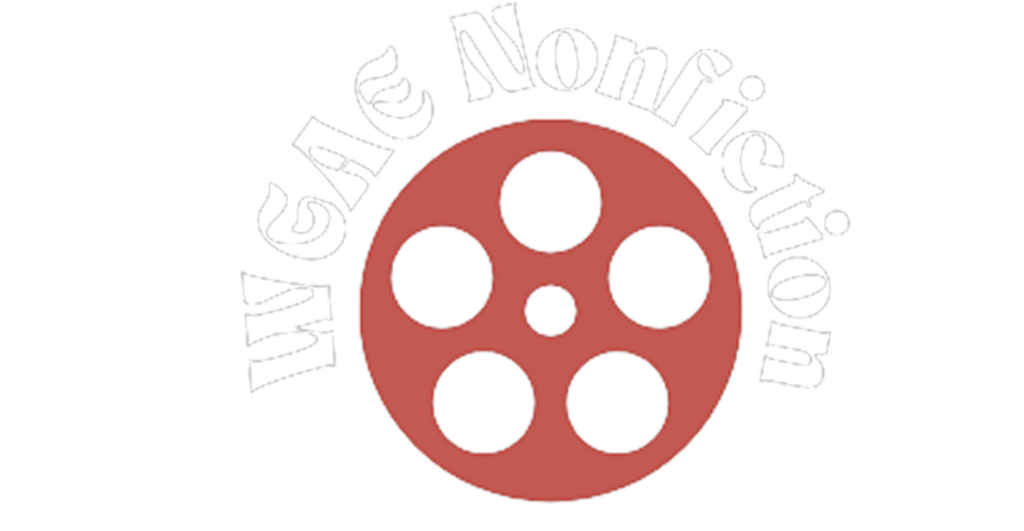
- A+E Nonfiction Union
- Writers Guild of America East